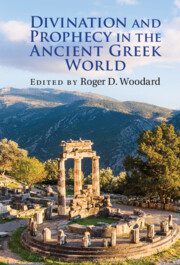Book contents
- Divination and Prophecy in the Ancient Greek World
- Divination and Prophecy in the Ancient Greek World
- Copyright page
- Contents
- Contributors
- Acknowledgments
- Abbreviations
- General Introduction
- 1 Greek Divination as the Transformation of an Indo-European Process
- 2 On Divinatory Practices and la raison des signes in Classical Greece
- 3 Oracle and Client
- 4 Oracular Failure in Ancient Greek Culture
- 5 The Dynamism of Mouvance in the Pronouncements of the Delphic Oracle
- 6 Decentralising Delphi: Predictive Oracles, Local Knowledge and Social Memory
- 7 Oracular Tales before Historiography
- 8 Omens and Portents Foretelling Victory and Defeat: Ontological, Literary, and Cognitive Perspectives
- 9 The Use of Divination by Macedonian Kings
- 10 False Prophets and Fake Prophecies in Lucian
- 11 Afterword
- Bibliography
- Index
3 - Oracle and Client
Published online by Cambridge University Press: 22 December 2022
- Divination and Prophecy in the Ancient Greek World
- Divination and Prophecy in the Ancient Greek World
- Copyright page
- Contents
- Contributors
- Acknowledgments
- Abbreviations
- General Introduction
- 1 Greek Divination as the Transformation of an Indo-European Process
- 2 On Divinatory Practices and la raison des signes in Classical Greece
- 3 Oracle and Client
- 4 Oracular Failure in Ancient Greek Culture
- 5 The Dynamism of Mouvance in the Pronouncements of the Delphic Oracle
- 6 Decentralising Delphi: Predictive Oracles, Local Knowledge and Social Memory
- 7 Oracular Tales before Historiography
- 8 Omens and Portents Foretelling Victory and Defeat: Ontological, Literary, and Cognitive Perspectives
- 9 The Use of Divination by Macedonian Kings
- 10 False Prophets and Fake Prophecies in Lucian
- 11 Afterword
- Bibliography
- Index
Summary
This essay is an attempt to test against the Greek evidence the broad assumption of most students of divination that, other things being equal, oracles and diviners want to give clients good news, to tell them what they want to hear or, if not that, what they expect to hear, what they will accept as a reasonable, plausible answer for a god or a god’s intermediary to give. Two related issues that obviously arise are those of how the oracle/diviner could know the client’s wishes and how responsive they could be even where those wishes were known, particularly now that we know that a technique comparable to the ticket oracles of Egypt, requiring a randomly chosen yes/no answer, was one method used at Dodona. Conventions governing the kinds of questions that could be asked and the terms in which they were framed emerge as crucially important. An appendix discusses ‘Two Functions of Divination: Advice and Prediction’. Advice relating to a decision was clearly what was sought from oracles and diviners throughout the Classical and Hellenistic periods, but a shift towards prediction can perhaps be observed in later antiquity.
- Type
- Chapter
- Information
- Divination and Prophecy in the Ancient Greek World , pp. 67 - 92Publisher: Cambridge University PressPrint publication year: 2023
- 1
- Cited by

